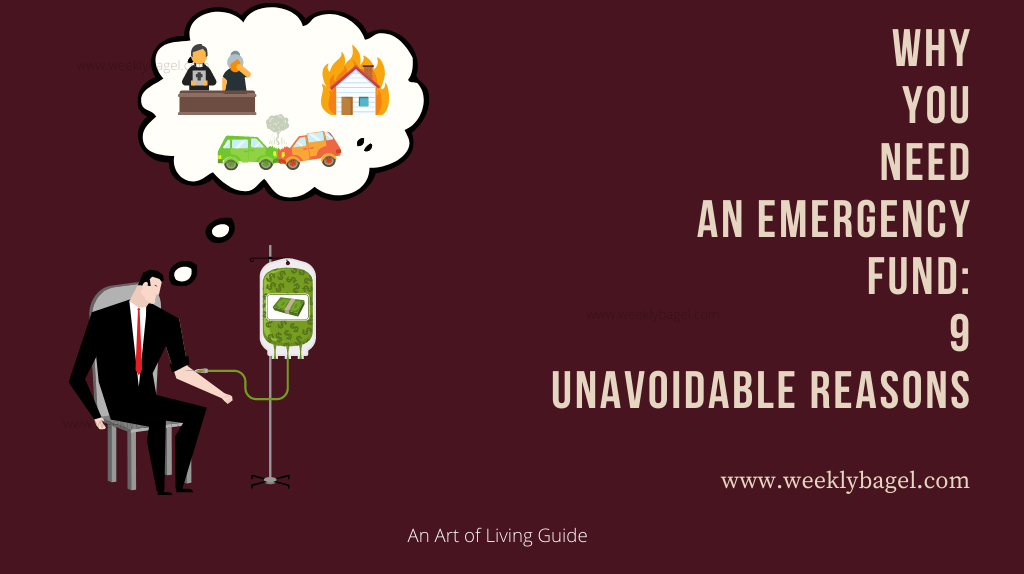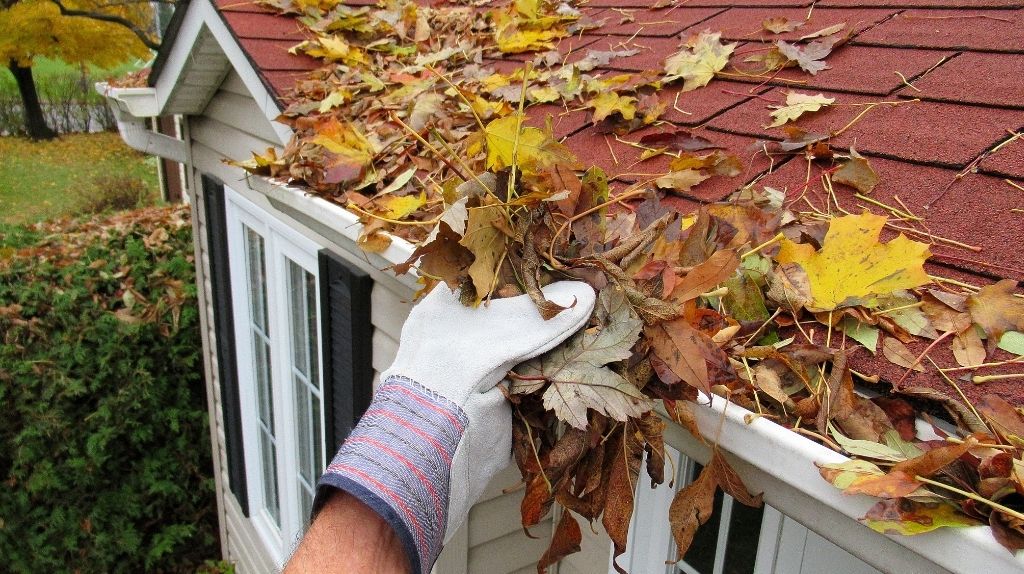
Life is unpredictable. Life-changing situations can occur suddenly, when least expected. Sometimes, these situations can cost you a lot financially. Without an emergency fund to handle life-changing situations, they can create untold hardships for you. Some can get you so deep in debt, that you may never be financially free again in life.
Scary thought, is it not?
Well, it is a reality that happens all the time. That is why an emergency fund should be an important aspect of your life. An emergency fund is a fund one sets aside to handle unexpected big financial problems. It is reserved for situations that require you paying out of pocket. You know, the kind of situations that insurance companies do not cover. Emergency fund takes care of these financial situations.
Is emergency fund the same as a rainy day fund?
Not quite. While a rainy day fund is set aside to handle small financial problems in your life, an emergency fund takes care of costly life-changing events. A great example of a costly life-changing event is the funeral expense of a close family member.
Additionally, an emergency fund is not a financial fund. A financial fund is a traded financial security. Some examples include stocks and mutual funds. Your emergency fund is not these. Also, it is not something to be invested into financial security such as stocks; or, invested into bitcoins and similar investments. These defeat the purpose of having an emergency fund, since they do not make the money readily available to you in case of necessity.
Personally, it is a saving account in the bank that should not be touched or used until its necessity is required in your life. Below are the reasons why you need an emergency fund in your life.
Why is it so important to have an emergency fund?
Just like food and air you consume, an emergency fund is an absolute necessity in your life. Here are why:
1. You Need It To Survive Massive Job Layoffs
Just like life, a job layoff is not predictable. At least, it is not predictable for the workers at the bottom of the corporate ladder. Usually, a layoff starts with this group.
Often, there is this illusion of job security. This may hold true during a good economy time in a country. In such good economy days, you can only lose your job position when you are fired as a result of unethical decisions or incompetency on your side. However, job security does not hold true during a disruption of good economy time. In fact, the corona pandemic this year has proven this case to be quite true.
According to the U.S BUREAU OF LABOR STATISTICS , 40.4 million people reported to have lost their jobs in June 2020 due to their employers getting closed because of COVID-19. That is a sudden life-changing situation that you could not have predicted in 2019. Without a steady means of income, life could be difficult for these people since their responsibilities do not wait for them to get another job.
In the absence of an emergency fund, you will experience a lot of financial problems in a situation like the above. These include from affording foods to paying your bills. It is even more difficulty for a household with children, since they are additionally mouths to feed and cater for. An emergency fund goes a long way in helping avoid the misfortunes associated with a mass layoff or job loss.
What about the government stepping in to help provide food stamps for you in such a situation?
Well, there is so much the government can do for you. I mean they can provide you food stamps, but they will not pay for your mortgage, car notes and your other bills. That is why you need an emergency fund. It is not that the government will not help during a job loss through unemployment claims, but the fact that their help will not be enough to offset the mounting debts in such a situation.
2. Death Of A Family Member Expenses
One of the most devastating events in life is the loss of a family member. It crushes the soul to pulp. Besides the emotional stress, there is the hefty financial stress of giving the loved one a befitting burial. This is an important reason to have an emergency fund. Death is the ultimate fate which will happen to us all at some point. Just like life, it is not predictable at all.
Whenever I talk to my fellow millennials about the possibility of death and funeral expenses, they get uncomfortable. They just do not want to hear about it. On their minds, they will marry and grow old to see their grandchildren.
But, are we all really going to grow old?
Let us face reality. You and I have known people- beloved ones, who had died at a young age. Some got married; then, they died while raising a family. Others died of diseases or accidents. Whichever way it is, there is a constant possibility of death. This is the awareness I want you to have on the back of your mind.
Now, the big question here is the person who gets to pay for the funeral expenses when the unexpected happens. If you are a family man or woman, an emergency fund will reduce the cost of the burial ceremony for your partner. This is vital in cases where there are children in the family. You do not want a situation where a funeral expense leaves the family broke. That is why you need an emergency fund in place for life-changing situations like a death in the family.
In fact, let us look at the cost of a funeral.
According to Federal Trade Commission: Consumer Information , a cheap casket costs more than $2000. Some go all the way to $10,000. These costs are for the caskets alone. The funeral service, cemetery burial plot and other services are not included yet. In the absence of an emergency fund, you will agree with me that this can be up to half a year’s salary of most people. For low income families, this is a financial burden. It is a financial burden that can be reduced greatly, if there is an emergency fund for such a situation.
3. You Need It For Sudden Medical Emergency
A medical emergency is likely to happen in your life time. It is unavoidable. This is because life is unpredictable. You can be walking on the street; then, someone comes along and runs you over. Or, you suddenly have an illness that threatens your life. It happens in life. Just because it has not happened to you, does not mean it does not happen to other people.

When you think of it, it sounds extreme. But, I am a pragmatic person. In the Art of Living, I expect you to be pragmatic too. It helps to weed out illusions that cloud your ability to see reality for what it is. In other words, you can have a sudden medical emergency any day.
Now, you may think that is what medical insurance is all about. You are right. Do you also know that in cases of trauma surgery, medical insurance does not pay 100% of your medical expense?
Similarly, a trauma surgery that crosses multiple surgical specialties: General, Orthopedic and Plastics, can rack up to one hundred thousand dollars of medical bills. I know this for a fact, because my girl’s surgery after her ghastly car accident in Fall 2019 was four hundred thousand dollars!
And, she was bed-ridden for months.
Listen, I want you to think about the next sentence. She would not have taken care of her bills without an emergency fund. My girl was bed-ridden for months; as a result, she could not work. But, the emergency fund she set up for such a situation took care of her living expenses- rent, car note, car insurance, dental insurance, health insurance, and other bills for months. The government never gave her a single penny or help.
Speaking of my girl’s setup of an emergency fund prior to her accident, I want you to do exactly as she did. Set up an emergency fund for sudden medical emergencies. A health insurance does not guarantee being free from medical debt. That is why you need an emergency fund.
4. You Need It For Academic Expenses
In as much as the American Federal Government has made it easy to go to school in the United States through the provision of loans and grants, there are still certain attached expenses. This includes textbooks, library fees, student activity fees, certification exams, certified trainings, trips and others. You may not avoid these expenses, since the student financial aid is limited.
Without an emergency fund set aside for such unavoidable academic expenses, it is going to add to your monthly expense. One notable cost of going to school is the fuel cost of driving your car to campus. This cost varies monthly. However, it can increase during traffic disruptions or field trips. I remember, when I had to drive 35 miles for a medical field trip in a mortuary. That was an unavoidable academic expense which ate into my monthly budget for car fuel.
Besides, some universities do not make easy for students to park freely on campus. They charge students to park their cars in garages. Now, an emergency fund can help control the steep decline in your savings monthly as a result of parking fees. This is because some classes require you to be on campus four days out of five days. Therefore, $5.00 daily parking becomes $80 monthly; this is the cost of parking four days a week.
Also, it costs a lot to send your children to private schools if you are a parent with kids. The government does not pay for this, since they already made elementary and high schools free for every American family. According to the EducationData Organization, the average cost of sending your children to private Catholic elementary schools is $4,840. To the average American that makes $3000 monthly, this is a hefty amount to cut out of a monthly income without a sudden disruption of daily living. So, it is difficulty to pay such school fee without an emergency fund already in existence.
Well, how much should you have in an emergency fund then?
Let us say that you make $3000 monthly after income tax. If you put aside $250 monthly, you will have $3000 in 12 months. When you start your emergency fund early, you will have $15,000 by the time your child is five years old. At the age of ten years old, you will have $30,000 waiting to be used on your child’s private school expenses.
Wonderful, is it not? That is why you need an emergency fund. This is one of its powers. Click on the link, Budgeting 101: How To Best Budget Your money, to learn how to budget your money in order to create a sizeable emergency fund.
5. You Need It For Additional Car Maintenance Cost
Car insurance does not cover car maintenance. I mean mine does not cover it. If yours do at the rate which I pay monthly, it will not hurt to switch to your car insurance. Anyways, car maintenance is often paid out of pocket. Meaning- it comes out of your savings.
How can you avoid this expense?
In fact, you cannot avoid it since a car needs to be maintained in order for it not break down. Every six months or so, your car engine oil is due. Besides, there are other maintenance such as axle alignment, tire repairs, windshield change or other unexpected problems. Without an emergency fund in place, you can end up paying a sizeable amount of money out of pocket. I am talking about $50 to a few hundred dollars.
Since this is an unavoidable expense that will create a dent in your monthly budget, you can offset this burden with an emergency fund. Let me elaborate. If you are making $1500 monthly, $25 monthly in your emergency fund can reach more than the exact amount for an oil change in six months. I assume this, if you are living within your income. Check out my blog post, Budgeting 101: How To Best Budget Your money , for how to save $672 annually on a $1350 monthly income.
6. It Is Needed For House Maintenance

Besides lawn care and plumbing expenses, there are natural catastrophes that require a costly house maintenance. These include forest fires, hurricanes, hails, earthquakes and other sudden natural acts. Sometimes, the cost of maintaining the house may require rebuilding the house as a whole again. This is especially the case in forest fires, earthquakes and hurricanes.
Do you think this is true?
You are right. The worst case scenarios are why an emergency fund is a necessity. The last thing responsible adults like you and me want, is a sudden disruption of our Art of Living. Sometimes, it creates a tremendous amount of stress. Even when inanimate object like a house is involved.
Trust me, having an emergency fund is an absolute necessity in your life. Now, I do not neglect the importance of having an insurance on your house too. But, you will agree with me that an insurance company cannot pay 100% of the value of your house; or, the full cost of fixing it up in case of a natural disaster. If they did, they would have to do it for millions of their customers too. And, it will leave them broke. As a result, they come up with ways to make sure you do not bankrupt them.
With all due respect, I do not blame insurance companies at all. There are businesses. So, it is understandable. That is why you need to look out for yourself too. You can only do this, by setting up an emergency fund for situation that requires you to rebuild or maintain your house.
7. You Need It For A Peace of Mind
Oh! I like this one very much. I think you do too. Everyone loves a state of tranquility, especially when it has to do with personal finances. This is what you get, after you have set up an emergency fund and contributes monthly into it.
On Why We Struggle To Make Ends Meet As Working Class Americans, I discuss how jobs nowadays are no longer adjusting our salaries to match the rate of inflation amongst other things. Having an emergency fund, ensure you do not have to suffer through any economic crisis or disruption. We all know companies do not think twice, before laying people off in these situation. An emergency fund makes sure you have a peace of mind in these scenario.
Besides a peace of mind, there is a kind of confidence that comes with having a sizeable emergency fund . You know, one which numbers in thousands of dollars. It makes you walk and talk differently. Not because you are rich, but due to the fact that you are not fearful about the future. Come whatever must financially, you have got a head start.
When you think about it, it kinda reminds of the old Scout’s motto: Be Prepared. Does it not, my esteemed reader?




 Grocery Bill Hack: How To Save Money on Drinking Water
Grocery Bill Hack: How To Save Money on Drinking Water